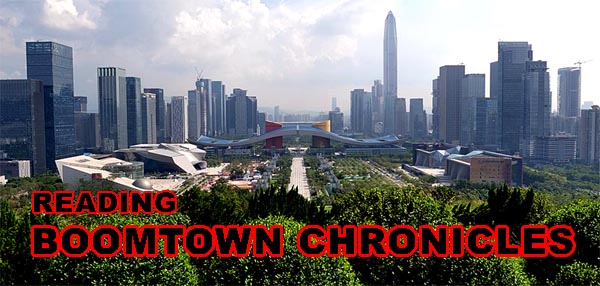 |
| Shenzhen, the Boomtown (Wikipedia) |
Note: Between Lesson #01-128 and #01-207, I wrote 72 lessons explaining expressions in articles published in the Shenzhen Daily. Read more about "Reading Boomtown Chronicles."
Get Ready: What do you think is more important in a society: its customs or its rules?
Boomtown Chronicles Part VI - published Monday, July 21, 2008
- In the early days of Shekou, there were no "rules or customs" to follow.
rules or customs: You may not realize the contrast inherent in these words. Rules (and laws are just a special kind of rule) are fixed by a group, such as a committee or a congress, and are written down. Customs, on the other hand, are created in practice by social groups and maintained by oral tradition and by practice. For example, it is a rule of law that we must pay a fare to ride buses; however, by custom we offer our seat to elderly passengers on the bus. A fresh experiment like Shenzhen, however, was breaking ground so quickly that neither the rules nor the customs provided guidelines for many of the new situations, so pioneers like Yuan Geng had to make up procedures as they went along.
- Shenzhen's first club for expatriates was given "official blessing."
blessing: approval, especially by someone in power. It is used figuratively here, not in the sense of coming from God, but from a powerful body like the government.
- Yuan Geng was good at convincing foreign investors to "pour money" into Shekou.
pour: give freely, like water pouring into a glass.
- Yuan warned that someone might be "sacked."
sacked: fired, or removed from a job. This is British English. It can also be phrased "given the sack." Some authorities say it dates back to when tradesmen (such as carpenters) brought their own tools to work. When discharged they would "get the sack" that their tools were in and leave. (In American English, the more common term is "to be fired.")
- Foreign oil companies made "pungent complaints."
pungent: biting, or sharply expressive. "Pungent complaints," then, were stated strongly in a very expressive way, not gently and with tact. I must admit, this one had me stumped at first, since it's not a common expression. The word "pungent" usually means "strong-smelling." I only learned this second, less-common meaning after I looked it up.
--------Read more: https://en.wikipedia.org/wiki/Shenzhen
Practice: Choose the correct term to fill in the blank in the sentence below:
- blessing
- customs
- pour
- pungent
- rules
- sacked
- The boss asked Ted to quit making ________ comments in our meetings.
- If you dine out in Rome, you must follow the Romans' ________.
- The board has given its ________ to our new budget.
- We cannot continue to ________ manpower into projects that don't pay off.
- Lee might get ________ if he keeps arriving late to work.
- All new drivers have to take a test covering the ________ of the road.
Answers are in the first comment below.
Submitted to the Shenzhen Daily for July 28, 2008


Answers to the Practice: 1. c; 2. b; 3. d; 4. a; 5. f; 6. e
ReplyDelete